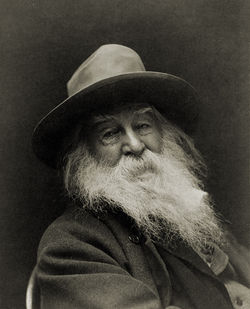Walt Whitman
Walter Whitman (1819 - 1892) was an American journalist, essayist and poet. Whitman is now considered to be one of the founders of modern American poetry.
Whitman was the prototype of the American self-made man. Born in West Hills, Long Island, New York, he started as an office boy in a law firm, worked a while as a printer, then as a village school teacher, founded several magazines, built houses, and meanwhile continued working on his magnum opus, Leaves of Grass. Whitman never married, never left America, never sought after wealth and property, did not belong to any club, preferred the company of ordinary people and was always optimistic and cheerful. People who knew him well described him as slow moving, tolerant, democratic, responsive, and generous to everyone. He provided vivid, first-hand witness to the sufferings of wounded Civil War veterans. He passed away while living in Camden, New Jersey
Leaves of Grass
Whitman's best known work is the poetry collection Leaves of Grass, a book-sized open written in free verse. As well as shorter poems (notably 'A Noiseless Patient Spider'), Leaves of Grass consists mainly of three long poems: ‘I Sing the Body Electric,' ‘The Sleepers,' and ‘Song of Myself'. Whitman self-published it beginningin 1855 and continued editing and working on it until his death. Considered his most personal and political work, it is also now considered a masterpiece of American literature.
Reception of his poetry
The first edition was self-published and received only moderate attention from the public during Whitman's lifetime. In several poems, Whitman glorifies the human body in ways that did not fit in with the Victorian ethics of the time. Despite its revolutionary content, subsequent editions failed to get noticed in the United States. Outside the U.S.A. the reception was much better, especially in France, where Whitman's humanism influenced the naturalist literary movement. By 1865, Leaves of Grass had made Whitman famous and was now accepted by a major publishing house.
A group of those poems about the Civil War is sometimes published separately under the title Drum-Taps.
